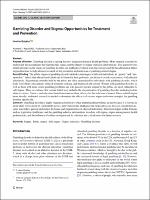Please use this identifier to cite or link to this item:
https://hdl.handle.net/20.500.12202/9670| Title: | Gambling disorder and stigma: Opportunities for treatment and prevention |
| Authors: | Quigley, Leanne 0000-0002-3676-4083 |
| Keywords: | Stigma Public stigma Self-stigma Stigma reduction Gambling disorder |
| Issue Date: | 2022 |
| Publisher: | Springer International Publishing |
| Citation: | Quigley, L. (2022). Gambling disorder and stigma: Opportunities for treatment and prevention. Current Addiction Reports, 9, 410 – 419. https://doi.org/10.1007/s40429-022-00437-4 |
| Series/Report no.: | Current Addiction Reports;9 |
| Abstract: | Purpose of Review: Gambling disorder is among the most stigmatized mental health problems. More research is needed to understand the mechanisms that underlie this stigma and the effects of stigma-reduction interventions. This paper reviews extant literature on the stigma of gambling disorder and highlights evidence from this research and the broader mental illness stigma literature to help advance research on the prevention and reduction of gambling-related stigma. Recent Finding: The public stigma of gambling disorder includes stereotypes of affected individuals as “greedy” and “irresponsible,” beliefs that affected individuals are to blame for their problems, and desire to avoid social contact with affected individuals. Stigmatizing attitudes held by the public are often internalized by individuals with gambling disorder, which leads to problem concealment, reduced treatment-seeking, and decreased self-esteem. Women with gambling disorder, as well as those with more severe gambling problems and who perceive greater stigma by the public, are most vulnerable to self-stigma. There is evidence that certain beliefs may underlie the stigmatization of gambling disorder, including beliefs about its causes. Contact- and education-based interventions show efficacy for the reduction of mental illness-related stigma more broadly; additional research is needed to determine the efficacy of various stigma reduction strategies for gambling disorder specifically. Summary: Gambling disorder is highly stigmatized relative to other mental health problems, in part because it is viewed as more likely to be caused by controllable factors. Interventions that emphasize the biopsychosocial etiology of gambling disorder may help to prevent and reduce the blame and stigmatization of affected individuals. Structural stigma within domains such as legislation, healthcare, and the gambling industry, interventions to reduce self-stigma, stigma among mental health professionals, and the influence of culture on stigma and its reduction are critical issues for future research. |
| Description: | Scholarly article / Open access |
| URI: | https://hdl.handle.net/20.500.12202/9670 |
| ISSN: | 2196-2952 |
| Appears in Collections: | Ferkauf Graduate School of Psychology: Faculty Publications |
Files in This Item:
| File | Description | Size | Format | |
|---|---|---|---|---|
| Quigley 2022 OA Gamgling disorder s40429-022-00437-4.pdf | 586.89 kB | Adobe PDF |  View/Open |
This item is licensed under a Creative Commons License

